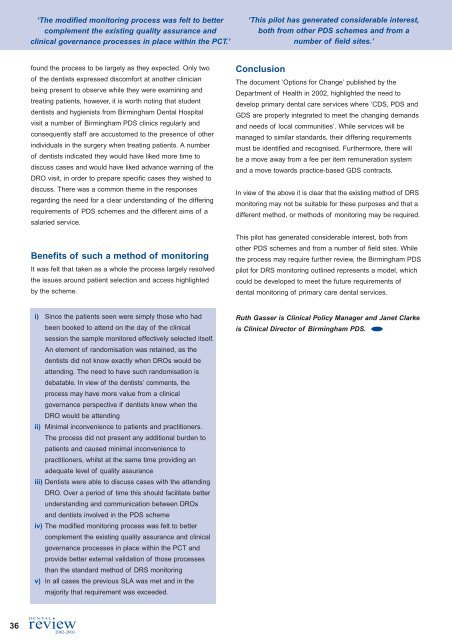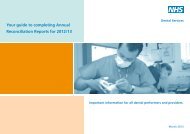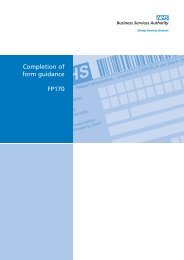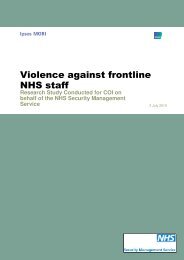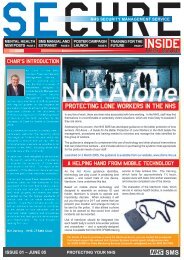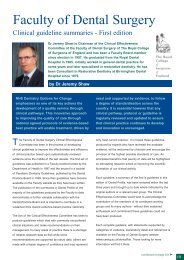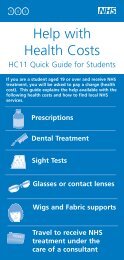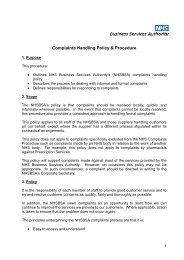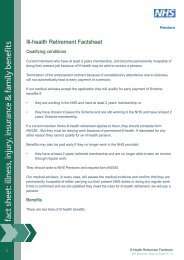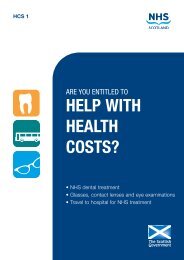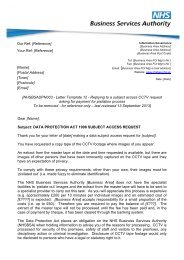DENTAL - NHS Business Services Authority
DENTAL - NHS Business Services Authority
DENTAL - NHS Business Services Authority
- No tags were found...
You also want an ePaper? Increase the reach of your titles
YUMPU automatically turns print PDFs into web optimized ePapers that Google loves.
‘The modified monitoring process was felt to bettercomplement the existing quality assurance andclinical governance processes in place within the PCT.’‘This pilot has generated considerable interest,both from other PDS schemes and from anumber of field sites.’found the process to be largely as they expected. Only twoof the dentists expressed discomfort at another clinicianbeing present to observe while they were examining andtreating patients, however, it is worth noting that studentdentists and hygienists from Birmingham Dental Hospitalvisit a number of Birmingham PDS clinics regularly andconsequently staff are accustomed to the presence of otherindividuals in the surgery when treating patients. A numberof dentists indicated they would have liked more time todiscuss cases and would have liked advance warning of theDRO visit, in order to prepare specific cases they wished todiscuss. There was a common theme in the responsesregarding the need for a clear understanding of the differingrequirements of PDS schemes and the different aims of asalaried service.Benefits of such a method of monitoringIt was felt that taken as a whole the process largely resolvedthe issues around patient selection and access highlightedby the scheme.ConclusionThe document ‘Options for Change’ published by theDepartment of Health in 2002, highlighted the need todevelop primary dental care services where ‘CDS, PDS andGDS are properly integrated to meet the changing demandsand needs of local communities’. While services will bemanaged to similar standards, their differing requirementsmust be identified and recognised. Furthermore, there willbe a move away from a fee per item remuneration systemand a move towards practice-based GDS contracts.In view of the above it is clear that the existing method of DRSmonitoring may not be suitable for these purposes and that adifferent method, or methods of monitoring may be required.This pilot has generated considerable interest, both fromother PDS schemes and from a number of field sites. Whilethe process may require further review, the Birmingham PDSpilot for DRS monitoring outlined represents a model, whichcould be developed to meet the future requirements ofdental monitoring of primary care dental services.i) Since the patients seen were simply those who hadbeen booked to attend on the day of the clinicalsession the sample monitored effectively selected itself.An element of randomisation was retained, as thedentists did not know exactly when DROs would beattending. The need to have such randomisation isdebatable. In view of the dentists’ comments, theprocess may have more value from a clinicalgovernance perspective if dentists knew when theDRO would be attendingii) Minimal inconvenience to patients and practitioners.The process did not present any additional burden topatients and caused minimal inconvenience topractitioners, whilst at the same time providing anadequate level of quality assuranceiii) Dentists were able to discuss cases with the attendingDRO. Over a period of time this should facilitate betterunderstanding and communication between DROsand dentists involved in the PDS schemeiv) The modified monitoring process was felt to bettercomplement the existing quality assurance and clinicalgovernance processes in place within the PCT andprovide better external validation of those processesthan the standard method of DRS monitoringv) In all cases the previous SLA was met and in themajority that requirement was exceeded.Ruth Gasser is Clinical Policy Manager and Janet Clarkeis Clinical Director of Birmingham PDS.<strong>DENTAL</strong>36 review2002-2003


